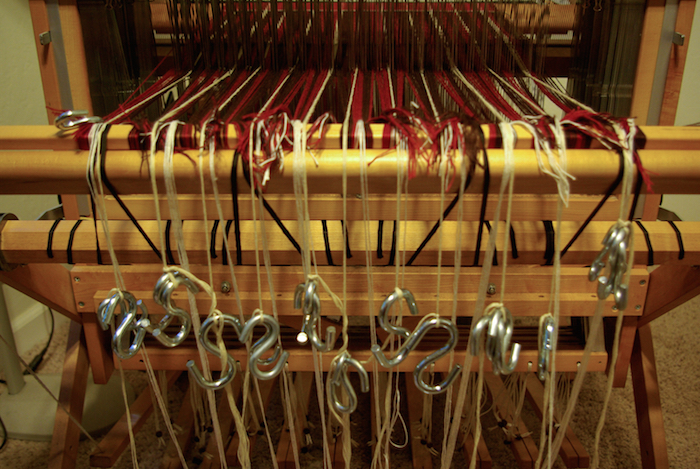I sit down at the loom and settle in to untangle threads.
I’d designed new towels, but, after weaving a sample, was unhappy with the design and decided to rework it. I took threads off the loom, rearranged some, removed others and added more. I knew that my decision to use as many of the threads from the first design as possible would lead to a mess and indeed it has.
From time to time I glance up at the clock. An hour has passed. An hour and a half. Around the two-hour mark, I think, This is not a good use of time. I should cut these threads and move on. But I keep working. If I cut the tangled threads, I have to cut all 525 threads and that’s too big a waste. Plus I’ve gotten caught up in the puzzle of untangling them.
Another hour passes. Finally, after another half hour, I call it quits for the evening. I’ve made good progress. The mess is significantly smaller. I’ll start fresh in the morning.
As I stand up and stretch, I wonder, Was the design I decided to rework a failure?
Failure is such a strong word, harsh and punitive. And so subjective.
Failure conjures images of tests and grades, of right and wrong answers. A big red F at the top of my math test in seventh grade because I forgot to write my name on the quiz. (For the record, all my answers were correct!)
At the loom, unlike when I was a student in a classroom, I’m in charge. I’m asking the questions and determining the answers.
I’ve woven color combinations I haven’t loved.
I’ve woven designs I don’t want to repeat.
I’ve had plenty of what the hell was I thinking? moments and taken at least one warp off the loom for “later.”
I’ve made mistakes. Some I’ve noticed in time to correct. Others I haven’t seen until I was hemming the finished napkin.
I don’t consider these experiences or projects failures, even if they’ve fallen short and disappointed my expectations.
I’ve learned so much about color. I’ve developed a sense of what I do and don’t like and how subjective my tastes are. I’ve learned how important it is to me to sink into a satisfying rhythm when I weave.
I’ve woven through What the hell was I thinking? and ended up with towels I really like. I’ve accepted doubt as part of my process and learned to reserve judgment until I see a finished sample.
As structured as weaving is, it’s also forgiving. I can unweave. I can take a warp – or some warp threads – off the loom. I can fix threading errors. I can repair broken threads. I can change my mind about some aspect of a design and set about the sometimes laborious process of altering it.
Failure sounds so final. A door closing, being locked shut with no way out.
“Fail” makes me think of “fall,” so I look up the etymology. According to the Online Etymological Dictionary it comes from Vulgar Latin *fallire, from Latin fallere ‘to trip, cause to fall;’ figuratively ‘to deceive, trick, dupe, cheat, elude; fail, be lacking or defective.’
I’ve tripped and stumbled. More importantly, I’ve gotten back up – which is at the heart of why I don’t think of these experiences as failures.
The next day I return to the loom refreshed and complete the untangling. When I see the new sample, I’m pleased the reworked design and am eager to weave.
I wind the bobbins for the first towel with a light heart. Any lingering doubts about hours spent untangling threads have vanished.




One of the reasons I love weaving is that patience is such a big part of it. “Mr. Scissors” has helped me through some rough periods and is only called upon in the most desperate times. So glad your warp worked out! You are always such an inspiration to me!
Ah, yes, scissors. They do come in handy! They’ve gotten me out of a couple dilemmas too.
Your post reminds me of the Japanese proverb, “fall down six times, stand up seven.”
Mistakes seem to be part of my own creative process. Usually they help me learn something: a skill I need to improve or I learn something about myself. All of the above are good although in the moment of learning I’m often feeling annoyed with myself, with my work, with life. I wish it could be easier!
Bob Ross used to use the phrase “happy mistakes,” and I like to remember that MAYBE my goof up is just that, a “happy mistake.” Innovation is often the child of error.
Love to you.
Just remembered, Bob Ross says “happy accidents.” Ha ha.
I like that proverb, Judy – “fall down six times, stand up seven.” Thanks.
I appreciate you pointing out that mistakes teach us both about skills and about ourselves.
Here’s hoping it gets easier!